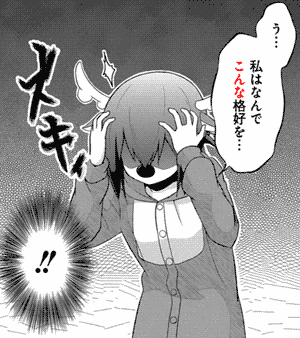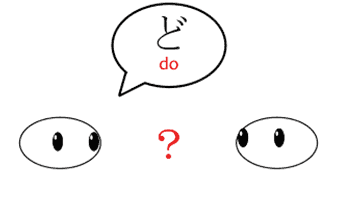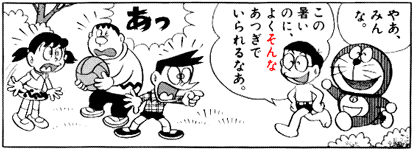In Japanese, konna, sonna, anna, donna こんな, そんな, あんな, どんな mean "like this [thing]," "like that [thing] (near you)," "like that [thing] (far from us)," and "like what [thing]?" They're kosoado words referring to how things are, or the appearance of things.
Usage
The way konna, sonna, anna, donna work is rather complicated. To begin with, they all refer to the same sort of thing, but in different ways, just like other kosoado pronouns:
- konna
こんな
This sort of. This kind of. This type of.
Like this [thing]. Like such [thing]. Such as this [thing].
The way this [thing is]. - sonna
そんな
That sort of. That kind of. That type of.
Like that [thing]. Such as that [thing].
The way that [thing] is. (near you.) - anna
あんな
That sort of. That kind of. That type of.
Like that [thing]. Such as that [thing].
The way that [thing] is. (not near us.) - donna
どんな
What sort of? What kind of? What type of?
Like what [thing]? Such as what [thing]?
In the way of what [thing]?
There are two important things to understand.
First, konna, sonna, anna, donna are all pronominal adjectives. This means they come before a noun, and mean "like the way this noun is." For example:
- konna fuku
こんな服
This kind of clothes.
Clothes such as these.
Clothes like these. - sonna chikara
そんな力
That kind of power.
Power such as that.
Power like that. - donna hito?
どんな人?
What kind of person?
A person such as what?
A person like what?- Phrase used to ask "what kind of person" someone is.
- Context: a girl suddenly finds herself in a reindeer costume.
- u...
う・・・
Uh... - watashi wa nande
konna kakkou wo...!!
私はなんでこんな格好を・・・!!
Why I, this sort of appearance...!!
- Why am I [dressed] like this...!!
- konna kakkou wo shite-iru
こんな格好をしている
To be making this sort of appearance.
To be dressed up like this.
In order to say simply "like this," "like that," "like what?" in Japanese, you'd use the pronouns kou, sou, aa, dou こう, そう, ああ, どう.
The second important thing to know is that sometimes the words konna, sonna, anna, donna can show up without a noun. This only happens under certain circumstances, so it will only be explained much later in the article.
Note that when the pronouns qualify a noun, the noun isn't necessarily a single word. It can be a noun phrase:
- konna manga
こんな漫画
This kind of manga. - konna omoshiroi manga
こんな面白い漫画
This kind of interesting manga.
An interesting manga such as this.- Here, manga is a qualified by the adjective omoshiroi, forming the noun phrase omoshiroi manga.
- konna omoshiroi manga ga aru nante, shiranakatta!
こんな面白い漫画があるなんて、知らなかった!
That an interesting manga such as this exists, [I] didn't know!
For reference, some more examples:
- donna kanji?
どんな感じ?
What kind of feeling?- How does it feel?
- What is it like?
- donna shokugyou ga aru no ka?
どんな職業があるのか?
What kind of jobs are there? - konna furui mono
こんな古いもの
A thing old like this. - anna yatsu ni makenaide!
あんなヤツに負けないで!
Don't lose to a guy like that! - sonna koto aru wake ga nai!
そんなことあるわけがない
There's no way something like that exists!
There's no way something like that happens! - sonna ii-wake ga tsuujiru to omou?
そんな言い訳が通じると思う?
Do [you] think an excuse like that is going to work?- tsuujiru
通じる
To pass. To get through.
For an excuse to pass, for an excuse to work.
- tsuujiru
- konna yarikata mo aru
こんなやり方もある
This kind of way of doing also exists.- You can also do it like this, the way I'm doing.
- yarikata
やり方
Way of doing [something]. - yaru
やる
To do [something]. - ~kata
~方
Way [someone] does [something]. (e.g. shaberikata 喋り方 is the "way of speaking" of someone,)
そんな vs. あんな
The difference between sonna and anna is that sonna そんな refers to something close to the listener, or that the listener mentioned, while anna あんな refers to something far from both speaker and listener. For example:
- konna fuku
こんな服
Clothes like this.
The ones I'm wearing, or holding.- konna fuku wa kitakunai
こんな服は着たくない
[I] don't want to wear this kind o clothes.
- konna fuku wa kitakunai
- sonna fuku
そんな服
Clothes like that.
The ones you're wearing, or holding, or talking about.- sonna fuku mo kiru-n-desu ne
そんな服も着るんですね
[You] wear that kind of clothes, too, huh.
In the sense that, besides wearing other kinds of clothes, they also wear the kind of clothes they're wearing right now. - sonna fuku wa iranai
そんな服はいらない
[I] don't need that kind of clothes [that you're talking about].
- sonna fuku mo kiru-n-desu ne
- anna fuku
あんな服
Clothes like that.
The ones that person is wearing, or holding.
Or maybe the clothes you mentioned, or I mentioned, but that one of us wore in the past, like yesterday.- anna fuku nido to kiru mon ka!
あんな服二度と着るもんか!
That kind of clothes, is something you wear twice?!
I won't wear that kind of clothes (that I wore in the past) twice.
I'll never wear that kind of thing again!
- anna fuku nido to kiru mon ka!
vs. この, その, あの, どの
The difference between konna, sonna, anna, donna and kono, sono, ano, dono この, その, あの, どの is that konna refers to something like this, but not specifically this, while kono refers to this thing specifically.
- kono hon ga suki
この本が好き
[I] like this book.- This one. Just this one specifically.
- konna hon ga suki
こんな本が好き
[I] like this kind of book.- Therefore, I'd like books of the same kind, similar to this one.
- Context: the weather is cold, but Nobita のび太 used a cream that makes him feel warmer the colder it is.
- yaa, minna.
やあ、みんな。
Hey, everybody. - kono atsui no ni, yoku sonna atsugi de irareru naa.
このあついのに、よくそんなあつぎでいられるなあ。
In this hot [weather], [it's amazing] [you] can be in that sort of warm-clothes.- Here, sonna qualifies atsugi 厚着, "warm clothes," like sweaters. Nobita isn't referring to any specific atsugi they're wearing, so he doesn't say sono. He's referring to any clothes of the warm clothes sort, because any such clothing would be hard to wear in "this hot weather."
- atsui no
暑いの
This is the adjective "hot" qualifying the no の particle, which acts as a nominalizer. In this case, it means the same thing as atsui tenki 暑い天気, "hot weather." - irareru - potential form of iru いる.
- a'
あっ
Ah!
こんなの, そんなの, あんなの, どんなの
The phrases konna no, sonna no, anna no, donna no こんなの, そんなの, あんなの, どんなの are simply konna, sonna, anna, donna with plus the no の particle, which acts as a nominalizer.
Basically, when konna, sonna, anna, donna come in the middle a phrase, they must come before a noun, or before ni に, to make sense syntactically. However, saying the noun in full can take too long, or feel too repetitive.
So this no の is a like a wild-card noun. It works like "one" in English. You don't know if "one" is a guy or girl, or if "one" is even a person or thing. You just know "like that one" means "like that one" and that's it.
- konna no kiitenai zo!
こんなの聞いてないぞ!
[I] haven't heard "something" like this!- I haven't heard anything like this! About this!
- Nobody told me about this kind of stuff!
- sonna no iya! そんなの嫌!
sonna no iya da! そんなの嫌だ!
"Something" like that is disliked!- I don't want something like that!
- Anything but that!
こんなに, そんなに, あんなに, どんなに
The phrases konna ni, sonna ni, anna ni, donna ni こんなに, そんなに, あんなに, どんなに are adverbial variants of konna, sonna, anna, donna. They have the ni に particle, which acts like an adverbial copula.
Grammatically, konna, sonna, anna, donna are adjectives, so they qualify nouns. When you need to qualify something that's not a noun, like an adjective or verb, then you use konna ni, sonna ni, anna ni, donna ni.
Often, these words tend to emphasis how "adjective" something is.
For example:
- muzukashii
難しい
Difficult. - sonna ni muzukashii desu ka?
そんなに難しいですか?
Is it that difficult?- Is it as difficult as you're saying?
- Is it that much difficult?
- aseru
焦る
To be in a hurry. - sonna ni aseranakutemo...
そんなに焦らなくても・・・
Even if [you] don't hurry that much...- Even if you don't hurry so much, everything will be alright.
- There's no need to hurry so much...
- You don't need to be in such a hurry...
Some other examples:
- Ore no Imouto ga Konna ni Kawaii Wake ga Nai!
俺の妹がこんなに可愛いわけがない!
There's No Way My Younger Sister is This Cute! - anna ni tsuyoi noni maketa-n-da
あんなに強いのに負けたんだ
Even though [he] was that strong [he] lost.
As always, avoid trying to understand things by translating them to English, it will give you unnecessary headaches:
- anna ni ganbatta noni!
あんなに頑張ったのに!
Even though [he] worked that hard!- Wait, where this "hard" came from? The phrase in Japanese only has a verb!
- ganbaru
頑張る
To put effort in something. To work hard.
Both donna and donna ni can work in the do~__~te-mo ど~ても pattern that all interrogative pronouns share:
- donna koto shitemo muda da
どんなことしても無駄だ
No matter what kind of thing [you] do, it's futile. - donna ni ganbattemo muda da.
どんなに頑張っても無駄だ
No matter how hard [you] work, it's futile.
And, of course, nimo, demo, etc.
- donna mirai nimo ai ga aru
どんな未来にも愛はある
In whatever kind of future, there is love. - donna teki demo wanpan de taoseru
どんな敵でもワンパンで倒せる
[He] can defeat whatever kind of enemy with one punch.
どんな Alone
When donna どんな shows up alone in a phrase, it's because it's at the end of the a sentence and the noun it's supposed to qualify has been abbreviated, omitted, and left implied.
For example:
そんな Alone
When sonna そんな shows up alone in a phrase, it's generally an expression of frustration. It works in the same way as donna being alone: the noun was cut out. The only difference is that, in this case, sonna refers to something the listener said, and, usually, it's some "some sort" of absurd demand.
- shinu made hataraite-morau!
死ぬまで働いてもらう!
[I'll] have you work [for me] until [you] die!- You'll work to death!
- sonna...
そんな・・・
Oh no!
What a tragedy!
Plz no.
Stahp!- sonna mucha na!
そんな無茶な!
...absurd like that! - sonna mucha na koto!
そんな無茶なこ!
Something absurd like that! - sonna mucha na koto sasenaide!
そんな無茶なことさせないで!
Don't make [me] do something absurd like that!
- sonna mucha na!



thats cool thnx for that :D - i got here by mistake and found some things i dont know before :D cool website
ReplyDelete